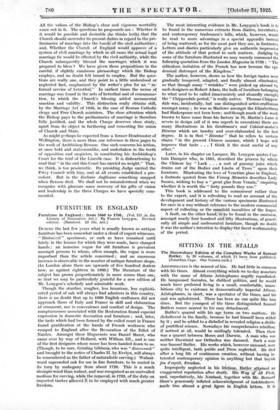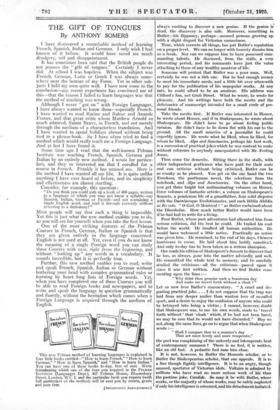SITTING IN THE STALLS
The Shrewsbury Edition of the Complete Works of Samuel Butler. In 20 volumes, of which 15 have, been published.
(Jonathan Cape. One Guinea each.)
ARLSTOPHANES is the nearest. of kin. He had little in common with his times. Almost everything which we to-day associate
with the name of Athens Aristophanes angrily repudiated.
He lampooned Socrates, he disliked politics, and he would much have preferred living in a small, comfortable, unam- bitious city to existence in democratically imperial Athens. Aristophanes, in short, was a spectator of the times, and his Seat was upholstered. There has been no one quite like him Since. But the youngest of the three distinguished Samuel Butlers comes nearest to his easy detachment.
Butler's quarrel with his age turns on two matters. He disbelieved in the family, because he had himself been stifled by it ; and he added to a disbelief in revealed religion a dislike of pontifical science. Nowadays his comprehensive rebellion, if noticed at all, would be smilingly tolerated. Then there was a quarrel between Moses and Darwin. A man who was neither Darwinist nor Orthodox Was damned. Such a man was Samuel Butler. His works which, however unsound, were quite intelligent, both public and Press neglected. He died after a long life of continuous creation, without having in- terested contemporary opinion in anything but that boyish jets d'esprit, Erewhon. Improperly neglected in his 4dime, Butler attained an exaggerated reputation after death: His •Way of fill Flesh, and, superlatively, his Notebook, together with Mr. Bernard Shaw's generously inflated acknowledgment of indebtedness, made him almost a great figure in English letters. It is always exciting to discover a new genius. If the genius is dead, the discovery is also safe. Moreover, something in Butler—his flippancy, perhaps—amused persons growing up with a slight disgust for Victorian earnestness.
Time, which corrects all things, has put Butler's reputation on a proper level. We can no longer with honesty dismiss him as a freak. Nor can we suppose him to have possessed com- manding talents. He discussed, from the stalls, a very interesting period, and his comments have just the value attaching to those of any wealthy amateur of life.
Someone will protest that Butler was a poor man. Well, certainly he was not a rich one. But he had enough money to meet his immediate needs, and a little bit over wherewith to pay for the publication of his unpopular works. At any rate, he could afford to be an amateur. His address was Clifford's Inn, not Grub Street. What he wrote, he wrote for pleasure. And his writings have both the merits and the
deficiencies of manuscript intended for a small circle of per- sonal friends.
Take the merits first. If Butler was interested in Homer, he -wrote about Homer, and if in Shakespeare, he wrote about Shakespeare. He didn't have to go about feeling public
Opinion. He didn't have to lie down flat with his ear. to the ground. All the small miseries of a journalist he could superbly ignore. He wrote what he liked, when he liked, for whom he liked. Alps and Sanctuaries, perhaps his best work, is a succession of practical jokes which he was content to make without reference to anybody unacquainted with Mr. Festing Jones.
Then come the demerits. Sitting there in the stalls, with other independent gentlemen who have paid for their seats and can criticize without being criticized, Butler can be as cranky as he pleased. You get on the one hand the two Erewlums, the posthumus novel, the selections from the
notebook, and Alps and Sanctuaries. On the other hand, you get three bright but unilluminating- volumes on Homer, three volumes of fantastic articles, a volume on Shakespeare's Sonnets, a ponderous life of a grandfather, four solid disputes with the Darwinesque Evolutionaries, and such Biblia Abiblia as Ex voto. " 0 God, 0 Montreal ! " as Butler exclaimed about
the Discobolus. How much better Butler would have been if he had had to write for a living.
Poor Butler, -whose past adventures had alienated him from serious criticism, did the best he could. He trailed his coat
before the world. He insulted all human authorities. He would have welcomed a little notice. Practically no notice was given him. He remained, to the end of his days, Chimera bombinaris in vacuo. He laid about him lustily unnoticel. And only to-day has he been taken as a serious champion.
One reads his edition of Shakespeare's Sonnets to discover that he has, as always, gone into the matter advisedly and well. He committed the whole text to memory, and he carefully studied the criticisms—all the criticisms—passed upon it
since it was first written. And then we find -Butler com- menting upon the lines :— " Why didst thou promise such a beauteous day And make me travel forth without a cloak ?'
Let us now hear Butler's commentary. " A cruel and dis- gusting practical joke. . . . I do not suppose that the trap was
laid from any deeper malice than wanton love of so-called sport, and a desire to enjoy the confusion of anyone who could be betrayed into being a victim ; I cannot, however, doubt that Shakespeare was, to use his own words, made to ' travel forth without ' that `cloak' which, if he had not been lured, we may be sure that he would not have discarded." May we not, along the same lines, go on to argue that when Shakespeare wrote :-
"Shall I compare thee to a summer's day
That art more lovely and more temperate,"
the poet was complaining of the unlovely and intemperate heat of contemporary summers ? There is no fool, it is written, like an old fool. A pedantic fool runs him close.
It is not, however, to Butler the Homeric scholar, or to Butler the Shakespearian scholar, that one appeals. It is to a free though flightly intelligence. It is to an angry, though amused, spectator of Victorian idols. Voltaire is admired by millions who have read no more serious work of his' than the pastime joke, Candide. So may it be with Butler, whose works, or the majority of whose works, may be safely neglected if only his intelligence is esteemed, and his detachment imitated.































































 Previous page
Previous page